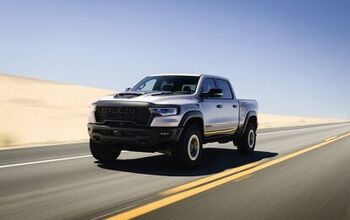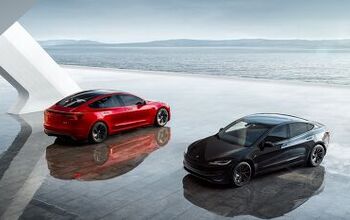Daimler, BAIC Investing $735 Million Into Chinese EV Production Pretty Much Out of Necessity

Daimler AG is dumping half of a 5 billion yuan sum, or 735 million dollars, into China as part of a joint venture with BAIC Motor Corp. Together, the companies plan to establish the groundwork for competent EV production in the region — meaning a good ol’ fashioned battery factory.
The bill is split between the two firms, as China requires every foreign automaker to partner with a domestic one to do business within the country. The new factory will be a product of Beijing Benz Automotive, a blandly named limited liability company created to further Mercedes’ interest within the country and bolster its EV production capabilities globally.
However, China remains a primary focus.
“We are investing in the world’s largest market for Battery Electric Vehicles,” said Hubertus Troska, Daimler AG’s board member responsible for its goings-on in China. “By 2025, the Chinese market will have a substantial share in sales of Mercedes-Benz electric vehicles. Therefore, local production will be key to the success of our EV portfolio, and crucial to flexibly serving local demand for electric vehicles.”
Mercedes-Benz, and any other automaker wanting to sell cars in China after 2025, has little recourse since the country is cracking down on emissions harder than the Dalai Lama. The government wants to push dirty engines out to make room for electrification and has set a mandate for the number of EV models an automaker is legally required to sell. But the cash allocated for the Beijing battery factory will also serve the global production network of future MB vehicles.
“Building another premium eBattery factory is the next step in the implementation of our electric strategy. Thus, we have the first foreign location in our global battery production network. The local production of batteries is crucial in order to meet the demand for electric vehicles flexibly and efficiently,” explained Markus Schäfer, head of production planning for Mercedes-Benz.
Daimler already has a battery facility in Kamenz, Germany, that’s currently undergoing an expansion. Mercedes plans to launch 10 new EVs by 2022, with the first, based off the the Generation EQ concept, due in 2019. However, that vehicle may not use the EQ name due to a pending trademark dispute with Chinese automaker Chery — a brand infamous for stealing other manufacturers’ designs.
[Image: Daimler AG]

A staunch consumer advocate tracking industry trends and regulation. Before joining TTAC, Matt spent a decade working for marketing and research firms based in NYC. Clients included several of the world’s largest automakers, global tire brands, and aftermarket part suppliers. Dissatisfied with the corporate world and resentful of having to wear suits everyday, he pivoted to writing about cars. Since then, that man has become an ardent supporter of the right-to-repair movement, been interviewed on the auto industry by national radio broadcasts, driven more rental cars than anyone ever should, participated in amateur rallying events, and received the requisite minimum training as sanctioned by the SCCA. Handy with a wrench, Matt grew up surrounded by Detroit auto workers and managed to get a pizza delivery job before he was legally eligible. He later found himself driving box trucks through Manhattan, guaranteeing future sympathy for actual truckers. He continues to conduct research pertaining to the automotive sector as an independent contractor and has since moved back to his native Michigan, closer to where the cars are born. A contrarian, Matt claims to prefer understeer — stating that front and all-wheel drive vehicles cater best to his driving style.
More by Matt Posky
Latest Car Reviews
Read moreLatest Product Reviews
Read moreRecent Comments
- MaintenanceCosts Whenever the topic of the xB comes up…Me: "The style is fun. The combination of the box shape and the aggressive detailing is very JDM."Wife: "Those are ghetto."Me: "They're smaller than a Corolla outside and have the space of a RAV4 inside."Wife: "Those are ghetto."Me: "They're kind of fun to drive with a stick."Wife: "Those are ghetto."It's one of a few cars (including its fellow box, the Ford Flex) on which we will just never see eye to eye.
- Oberkanone The alternative is a more expensive SUV. Yes, it will be missed.
- Ajla I did like this one.
- Zerofoo No, I won't miss this Chevrolet Malibu. It's a completely forgettable car. Who in their right mind would choose this over a V8 powered charger at the rental counter? Even the V6 charger is a far better drive.
- Offbeat Oddity Nope, I won't miss it. I loved the 2008-2012 Malibu, but the subsequent generations couldn't hold a candle to it. I think the Impala was much more compelling at the end.


































Comments
Join the conversation
Isn't it funny that China gets to demand that any foreign company partner with a domestic Chinese company, but in countries like the US, we have no such laws and that's considered a fair trade deal? I'd like to see the pendulum swing in the other direction, if for nothing else to just get the other side to agree to some concessions.
One thing that is interesting about TTAC is how many comments different headlines get. I remember one of my favorite series of articles about technical aspects of suspension set-ups; spring rates, and shock absorbers. This has very low reader response, and this is why this series was terminated. It looks to me like in this case there is not much interest in the fairness of Chinese industrial policy, I am surprised by small number of replies.